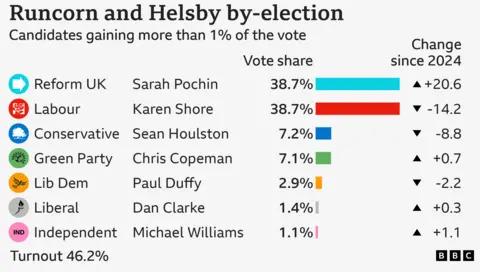Reform takes Runcorn from Labour by just six votes
Reform UK has won the Runcorn and Helsby by-election by just six votes, beating Labour after a dramatic recount.
In Sir Keir Starmer's first major electoral test as prime minister, former Conservative councillor Sarah Pochin overturned a 14,696 majority to take the Cheshire seat for Reform.
As well as winning its first ever parliamentary by-election, Reform also took its first mayoralty in Greater Lincolnshire, and control of its first councils in Staffordshire, Lincolnshire and Durham.
Labour held on in three other mayoral races and the prime minister responded to the losses by saying "I get it" and pledging to go "further and faster" on making changes.
Sarah Pochin has been elected as Reform's fifth MP on a massive 17.4% swing from Labour in what was one of the party's safest seats.
Campaigners claiming the result was "on a knife-edge" were proven correct when the first count put Nigel Farage's party ahead by just four votes and Labour requested a recount just before 0400 BST.
The final result, from a46.2% turnout, beats the previous post-war record for the closest by-election, which the Liberals won by 57 votes in Berwick-upon-Tweed in 1973.
Farage, who appeared at the count shortly before the result was declared, said his party takes on the responsibility that comes with winning elections "with glee".
"We can see that support for the Labour Party has collapsed within 10 months of them winning the general election," the Reform leader said.
"I think we've supplanted the Conservative Party now as the main opposition party in government."
He added: "The message that we're getting in places where we didn't win, was that if you vote Conservative you actually get Labour."
In her victory speech, Pochin - Reform's first female MP - said: "The people of Runcorn and Helsby have spoken - enough is enough.
"Enough Tory failure, enough Labour lies."
The by-election was triggered by the resignation of former Labour MP Mike Amesbury, following his conviction for assaulting a constituent.
One Labour campaigner told the BBC the government's controversial decisions to cut winter fuel payments for pensioners and disability benefits had affected the result in what had been a safe Labour seat.
"On every door it was the same story - winter fuel and PIP [personal independence payment]," they said.
Reacting to Labour losses to Reform, Sir Keir Starmer said: "I get it, we were elected in to deliver change, we've started that change – waiting lists down, wages up, interests rates down.
"The message I take out of these elections is we need to go further and faster on the change people want to see and that's what I'm determined to do."
When asked whether Farage's party was now the main challenge to Labour, the PM said: "Our case on the NHS is free at point of use, Reform's case is they should think about charging for NHS – I fundamentally disagree."
Nigel Huddleston, the co-chair of the Conservative Party, rejected Farage's claim that Reform were now the party of opposition as "not credible", pointing out that Reform now had five MPs to the Tories' 121.

Reform also had success in the mayoral race, with former Conservative MP and minister Andrea Jenkyns, who defected to Reform last year, became both Greater Lincolnshire and the party's first mayor.
She won with a majority of almost 40,000 over the Conservatives, and pledged Lincolnshire would be a "blueprint" for the way the party would run the country.
Labour held onto three of its four mayors, in Doncaster, North Tyneside and West of England, but was pushed into third place in Cambridgeshire and Peterborough behind the Conservatives and Reform. The Hull and East Yorkshire mayoral count was yet to declare.
In Doncaster, Labour's Ros Jones was re-elected with a majority of 698, and used the platform to criticise her party's decision to cut the winter fuel allowance, increase employer's national insurance contributions and squeeze benefits.
"I think the results here tonight will demonstrate that they need to be listening to the man, woman and businesses on the street, and actually deliver for the people, with the people," she told the BBC.
The Tories are defending the most seats in this set of local elections, which were last contested in 2021 when then-Prime Minister Boris Johnson was enjoying a surge in support following the rollout of the Covid vaccine.
Most council results are not expected until Friday afternoon but Reform made some early gains overnight, with the party winning more than half of the first 100 council seats to be declared.
By 1400 BST, the Conservatives had lost control of three of the 18 councils they controlled before this election, with Reform beating them in Staffordshire and Lincolnshire, as well as taking control of Durham.
Posting on X, Conservative leader Kemi Badenoch "These were always going to be a very difficult set of elections coming off the high of 2021, and our historic defeat last year - and so it's proving.
"The renewal of our party has only just begun and I'm determined to win back the trust of the public and the seats we've lost, in the years to come."
Shadow justice secretary Robert Jenrick - who was beaten to the Tory leadership last year by Badenoch - said she was doing a "bloody good job" and it would "be impossible to turn around this situation in such a short period of time".
 Reuters
ReutersLiberal Democrats are hoping to take seats off the Tories in places like Gloucestershire and Hertfordshire.
Party leader Sir Ed Davey has said he is thinks the Liberal Democrats will be "the new party of Middle England" after these elections as the "Tory vote is in meltdown".
Speaking on a visit to Shrewsbury he said voters were "very disappointed" in Labour and that Nigel Farage will "get found out" as the more people hear from Reform "they don't like it".
Elections on Thursday were held in a total of 23 councils in England – mostly in rural and suburban areas where the Tories have traditionally been strong – as well as for six mayors.
This is a smaller set of local elections than normal after the government announced polls would be postponed in nine areas, where councils are being re-organised.


Sign up for our Politics Essential newsletter to keep up with the inner workings of Westminster and beyond.
